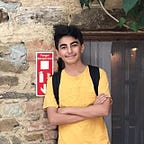Hilbert’s Infinite Hotel Paradox
Assume that you have an hotel and this hotel has an infinite number of rooms. Every room has a number: 1, 2, 3, 4 …. n.
Assume that you have an hotel and this hotel has an infinite number of rooms. Every room has a number: 1, 2, 3, 4 …. n. Whenever a guest comes, she finds out that every single room in the hotel is occupied (business is going very well indeed).
However, the hotel manager doesn’t want to refuse any costumers, so he makes a plan:
The hotel manager slides all the guest’s room to the next room. So the guest in the room 1 moves to the next room, room 2, the guest in the room n moves to the room (n+1). Now, room 1 is empty and the guest may be hosted in this room.
However, more and more costumers start to flow to the hotel.
Then one day a bus with infinite number of passengers arrive and all of those passengers wants to stay in your hotel. The hotel manager tries to think a way to host this much people in the hotel.
The hotel manager requests all of the guests to move to the room that is two times the guest’s room number. So the guest in the room number 1 moves to the second room, the guest in the room number 2 moves to the room 4, …….., the guest in the room number n moves to room number 2n.
As a result, you emptied all odd-numbered rooms. As we know there is infinite number of odd numbers, infinite number of guests can stay in the hotel.
What If An Infinite Number of Busses Containing Infinite Number of Passengers Each Come To Our Hotel?
He remembers that in 300 B.C., Euclid proved that there is an infinite quantity of prime numbers. So he makes his plan according to this theorem. In his plan, the manager assigns every current guest to first prime number, 2, raised to the power of their current room numbered room. So the current occupant of the room number 3 will go to the room number 8.
The manager then places the first bus’s passengers and places them to the second prime number, 3, raised to the number of the guest’s number in the bus. So the 4th guest of the first bus will goes to the room number 81.
And this thing goes on so while assigning the nthnumber bus’s passengers, the manager will assign take the passenger’s number in the bus and assign that passenger to the room number [(n+1)th prime]^(the passenger’s number in the bus) . For example, he assigns the 7thbus’s 9thpassenger to the room number 19^9 ( 19 is the (7+1)thprime). As a result of this matching mechanism, all infinite number of passengers of infinite number of buses will be hosted in the hotel and in addition, there will be some non-occupied rooms as well (like room number 6, 10, 12, 15).
If you want further information about this paradox, you may examine the paper of Prof. Dr. Ali Nesin* and the video created by Jeff Dekofsky**
*Nesin, Ali. “Sonsuz Odalı Otel.” Matematik Dünyası, 2003, pp. 13–14.
**Dekofsky, Jeff. The Infinite Hotel Paradox — Jeff Dekofsky. YouTube, Ted-Ed, 16 Jan. 2014, www.youtube.com/watch?v=Uj3_KqkI9Zo.
Chander, Charles Cristopher. “Black and White.” Pinterest, www.pinterest.com/pin/283937951477053499/.
